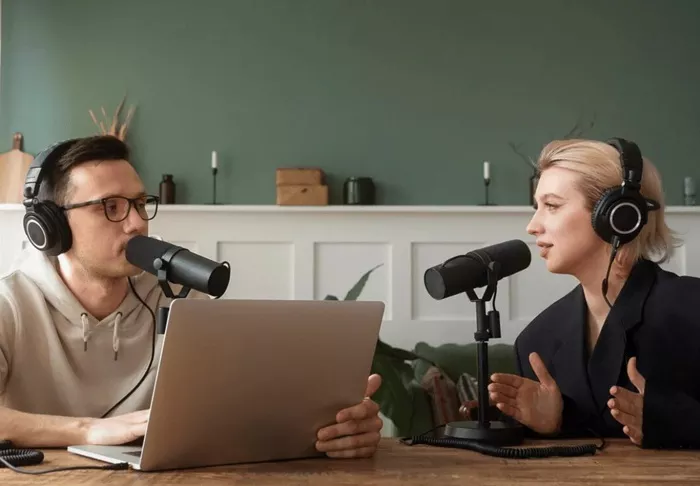In today’s digital world, content creation plays a crucial role in communication, education, and business growth. Two of the most popular formats for sharing information are blogs and podcasts. Blogs use written content to engage readers, while podcasts rely on audio storytelling to connect with listeners.
Blog vs. Podcast: Which Is Better? The answer depends on various factors, including your goals, audience preferences, and available resources. In this article, we’ll explore the key differences between blogs and podcasts, their advantages and challenges, and how to decide which one suits your needs best.
Blogs: The Power of Written Content
A blog is a collection of articles or posts published on a website. Bloggers share insights, opinions, news, and educational content in written form. Blogs are widely used by businesses, influencers, and individuals to communicate with their audience and establish authority in a specific niche.
Benefits of Blogging
Search Engine Optimization (SEO) Opportunities: Blogs are highly effective for improving search engine rankings. By using relevant keywords, providing valuable content, and following SEO best practices, bloggers can attract organic traffic to their websites.
Evergreen Content: Well-written blog posts can remain useful and relevant for years. Articles with timeless information continue to attract readers long after they are published.
Ease of Content Creation: Writing a blog requires fewer technical skills compared to producing a podcast. While strong writing skills are necessary, blogs do not require audio recording, editing software, or hosting services.
Shareability and Engagement: Blog posts can be easily shared across social media, newsletters, and online forums. Readers can leave comments, ask questions, and participate in discussions, creating an interactive experience.
Accessibility: People can read blogs at their own pace, skim through content, and return to specific sections when needed. Unlike podcasts, blogs do not require special software or uninterrupted listening time.
Challenges of Blogging
Time-Consuming Writing Process: Writing high-quality content takes time, effort, and research. Many bloggers struggle to maintain a consistent publishing schedule.
High Competition: The internet is filled with millions of blogs, making it difficult to stand out. A strong SEO strategy and unique content are necessary to attract and retain readers.
Limited Personal Connection: Blogs lack the emotional warmth of a human voice. While written content can be engaging, it may not create the same level of connection as a podcast.
Podcasts: The Power of Audio Storytelling
A podcast is an audio-based format where hosts discuss topics, share stories, or interview guests. Podcasts are available on platforms like Spotify, Apple Podcasts, and Google Podcasts, allowing listeners to consume content on the go.
Benefits of Podcasting
Convenience and Accessibility: Podcasts are easy to consume while commuting, exercising, or doing household chores. Unlike blogs, which require reading, podcasts allow people to multitask.
Stronger Personal Connection: The human voice adds personality and authenticity to content. Listeners often feel a deeper connection with podcast hosts, making it easier to build trust and loyalty.
Less Competitive Market: Compared to blogging, podcasting has fewer content creators, providing a better opportunity to stand out and build a dedicated audience.
Monetization Opportunities: Successful podcasters can earn revenue through sponsorships, advertisements, listener donations, and exclusive content memberships.
Repurposing Content: Podcast episodes can be converted into blog posts, social media clips, and YouTube videos, extending content reach and engagement.
Challenges of Podcasting
High Production Costs: Producing a quality podcast requires microphones, recording software, editing tools, and a hosting platform. Beginners may find these costs challenging.
Time-Intensive Editing Process: Unlike blogs, which require proofreading, podcasts need audio editing, noise reduction, and formatting. This process can be time-consuming and complex.
Limited SEO Benefits: Podcasts do not benefit from traditional SEO strategies. While transcripts can improve search visibility, they are not as effective as blog posts in driving organic traffic.
Lower Discoverability: Finding new listeners can be difficult because podcast directories have limited search functionalities compared to search engines. Strong marketing efforts are required for audience growth.
Which One Is Better for You?
Choose a Blog If:
- You enjoy writing and structuring written content.
- Your main goal is SEO and increasing website traffic.
- You prefer content that remains relevant for a long time.
- You have limited technical resources and prefer a lower production cost.
Choose a Podcast If:
- You enjoy speaking, storytelling, and engaging with audiences through voice.
- You want to build a deeper personal connection with your audience.
- Your target audience prefers listening over reading.
- You have the necessary resources to invest in recording and editing.
Can You Combine Both?
Yes! Many content creators use both formats to maximize their reach. For example:
- A podcast episode can be transcribed and turned into a blog post for SEO benefits.
- Blog posts can be read aloud and published as podcast episodes.
- A blog can summarize key points from a podcast, providing a quick overview for readers.
By combining both formats, you can enjoy the advantages of each while reaching a broader audience.
Conclusion
There is no definitive answer to whether a blog or podcast is better. The right choice depends on your content style, audience preferences, and available resources. If you enjoy writing and optimizing content for search engines, a blog is an excellent option. If you prefer storytelling and voice-based communication, a podcast might be a better fit.
Ultimately, experimenting with both formats can help you determine what works best for your audience and goals.
Related Topics
- Can You Use Canva for Your Blog?
- Can You Start A Blog Without Hosting?
- What Does Niche Mean in Content?

